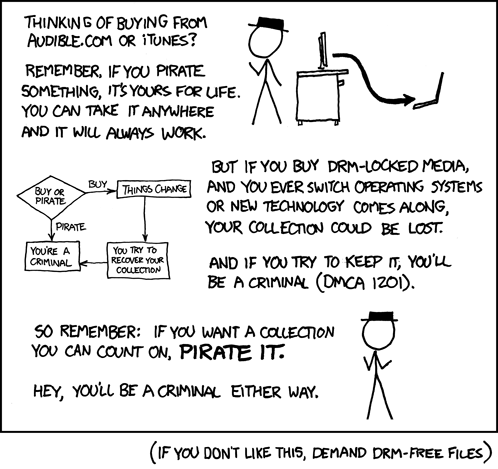All of this week blogs and websites around the globe have been celebrating Copyright Week, an initiative by the EFF to celebrate two years of the defeat of SOPA/PIPA. Copyright Week consists of a series of articles analysing the future of copyright reform, showcased in a number of sites and organisations such as Creative Commons, Public Knowledge, Techdirt, and BoingBoing. Although the list of participants and topics has been a bit US-centric, the level of the contributions has added quite a lot of depth to the ongoing debate. Copyright Week is culminating today with the celebration of Internet Freedom Day.
I have to admit that in the last year I have been losing some interest in the copyright wars and the so-called fight for Internet Freedom for various reasons. Perhaps the biggest source of disinterest is that after the publication of Snowden’s NSA revelations, every other topic appeared to be insignificant in comparison. So your government is trying to curb P2P file-sharing by criminalising copyright infringement? Big deal, there is an agency that is spying on all of us!
The other reason for my relative lack of interest with copyright is that we have continued to win battle after battle where it really matters. In the last few years Internet activists looking for more openness and more rational copyright policies have had several important victories:
- The defeat of SOPA and PIPA.
- The demise of ACTA.
- The Marrakesh Treaty.
- A growing number of countries have recognised the need to make publicly-funded research available to the public.
- Open access is fast becoming an acceptable method of scholarly publication.
- A non-negligible number of governments are opening up data to public uses.
- Creative Commons is becoming the de facto open content licensing scheme, and has now been adopted by international organisations such as the World Bank, OECD, WIPO and UNESCO.
- The copyright industry has had to change business models and enforcement strategies, and it has become easier to obtain content through legitimate means.
I do not want to sound triumphalist, but this is a very impressive list of achievements that would not have been foreseen in the early days of the copyfight. It was not so long ago that Creative Commons was being demonised by members of the copyright industry, and it was not so long ago that the music industry engaged in the indiscriminate persecution of thousands of people for file-sharing. With few exceptions, these episodes have disappeared, and there is a growing sense that things are changing for the better.
However, as much as I want to be an optimist and look at the glass half-full scenario described above, we still have a lot to do to claim victory for the openness camp. There are also lots of signs that things need to change, and copyright issues are still of serious concern:
- Only a year ago Aaron Swartz was hounded to death by zealous prosecutors fulfilling a copyright maximalist agenda.
- The content industry continues to pursue intermediaries by attempting to obtain blocking orders against file-sharing sites in a strategy that has not proven to be effective in the slightest.
- Some academic publishers continue to wage a secret war against open access.
- Apple continues to operate on a closed garden model where interoperability is a dream.
- The TPP is shaping up as a maximalist treaty that could criminalise non-commercial infringement.
- The domain name system has become vulnerable to seizures by content owners.
- Business models still need to change, this Oatmeal strip pretty much hits the nail on the head in describing the music industry.
But the biggest fear that I have at the moment is one that I have not seen formulated very often. As a result of the NSA leaks, we are learning that the US government has a considerable amount of control over the Internet, more than was previously considered. With privacy tools compromised, with security protocols riddled with backdoors, with the TOR network left vulnerable, and with reports that the very basic infrastructure of the Web might be subject to indiscriminate surveillance, it would be easy for US legislators to pass a law that would turn all of the security apparatus into a giant copyright enforcement machine. Mission creep is a real possibility nowadays, it will only take a few people in positions of power in the pocket of Big Content to have the NSA direct its sights against all of us.
Concluding, we should be proud of the achievements made so far, but complacency would be misplaced. There is still a lot to do to get copyright right, and those of us interested in openness and transparency must continue to struggle for a more rational system.
Here is where I make my Adama impersonation and shout “So Say We All!”, I always did have a flair for the theatrical exit.




1 Comment
Copywrong » Has The Copyright War Been Won — And If So, Are We About To Lose It Again? · January 24, 2014 at 11:51 am
[…] Reading Techdirt, it’s all-too-easy to get the impression that copyright is an utter disaster for the public — with current laws abused by governments, companies and trolls alike, and international agreements like TPP aiming to make the situation worse. But as Andres Guadamuz points out on his Technollama blog, things aren’t quite as bleak as they sometimes seem: […]